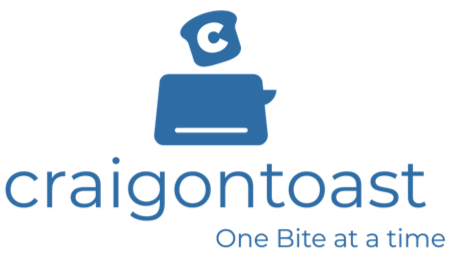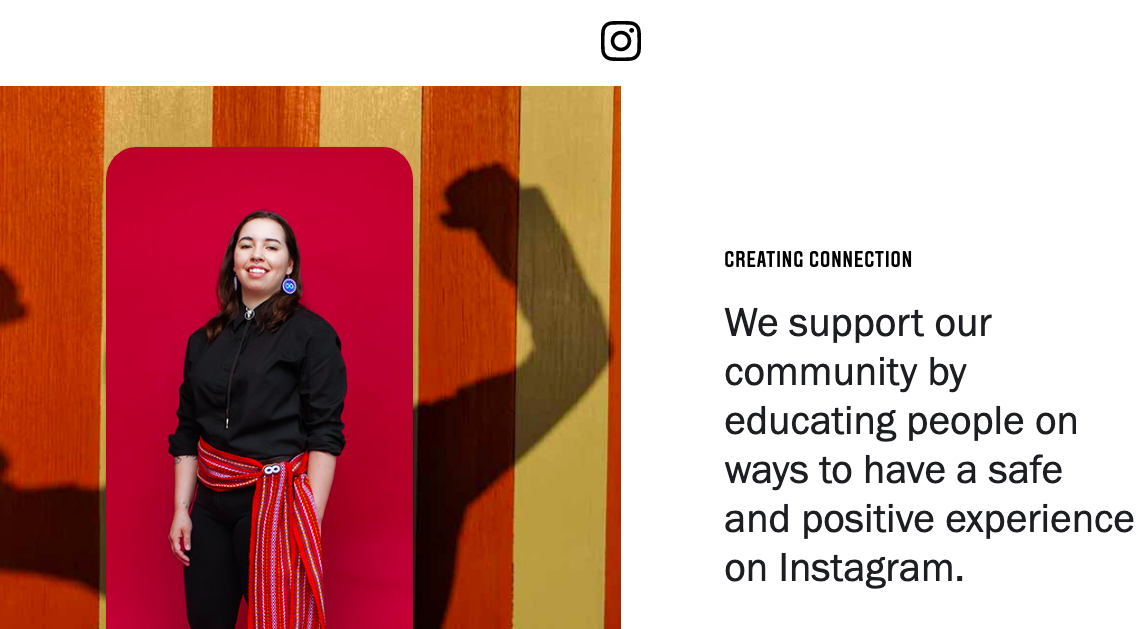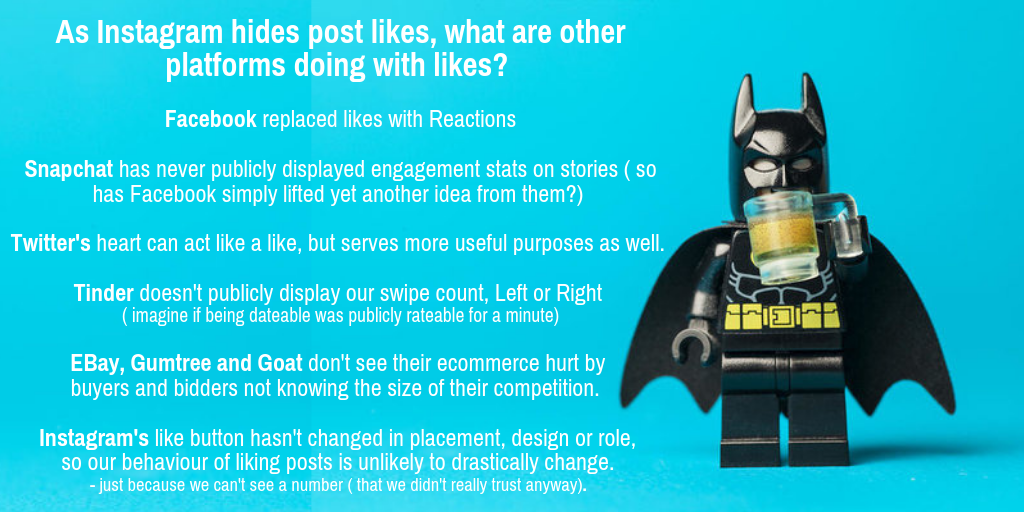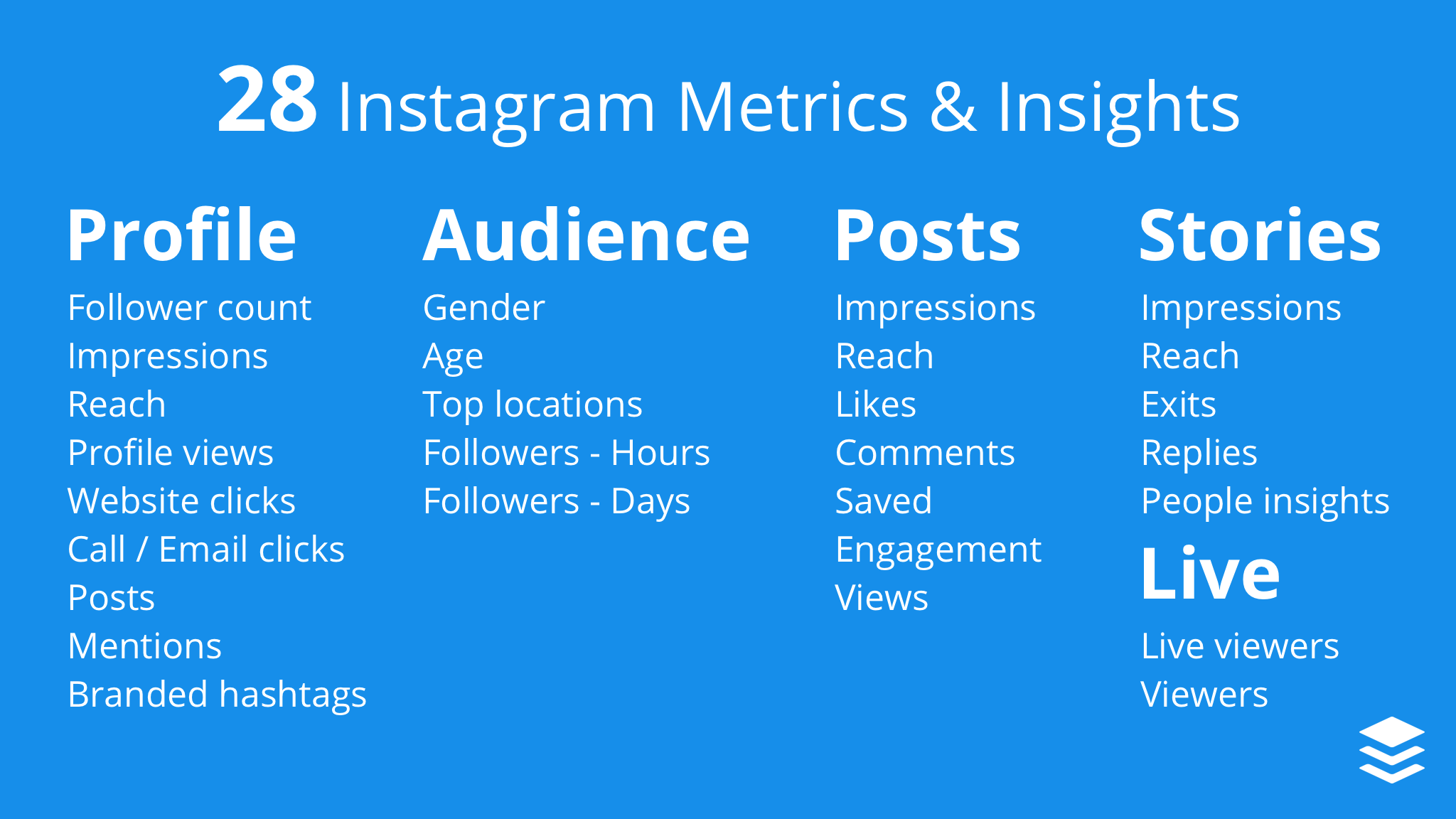A simple like, isn't as simple as you think.
The biggest headline of the week for social media has of course been the news that “Instagram is hiding likes”. The headlines aren’t exactly true though, and there has been A LOT of noise, discussion, questions, speculation, jokes and attention given to something that, in reality, sounds so… trivial.. Instagram says it's about competition, or content or connection or pressure..(or... getting your messaging aligned and clear?), some say it's about mental health, others about analytics and authenticity. While some influencers feel it's about reducing their influence and reclaiming ad dollars, the discussion around removing likes has also shown a thread of blind hatred for "influencers" that really needs to be addressed.
So exactly what are Instagram up to? Why are we taking likes away? What does it mean? How will it change as a result?.. and how is a little like button on a photo sharing app so layered with meaning it's newsworthy and globally #trending?
Let’s see if we can break this down..
summary
Instagram is trialling not publicly displaying the number of likes on posts , we will still be able to see likes on our own posts though. To test the impact of not seeing post likes, for now this has been rolled out on some user accounts in 7 countries.
Instagram says hiding likes is about reducing the pressure of competition that likes encourage, putting the focus back on connections and creativity
Mia Garlick, Director of Public Policy for Facebook and Instagram in Australia and New Zealand, says hiding post likes in this way is all about taking the "competition" out of posting and that "hiding the number of 'likes’ on a post will ease the "pressure" users feel when they're posting selfies and sunsets. Instagram wants to make sure that people are not feeling like they should like a particular post just because it's getting a lot of likes, and that they shouldn't feel like they are posting and sharing content solely to get likes".
In the US, Head of Instagram, Adam Mosseri says that hiding likes is about placing the focus back on creating and connecting with great content, adding “We want people to worry a little bit less about how many likes they’re getting on Instagram and spend a bit more time connecting with the people they care about.”
The messaging might not be quite aligned, but it sounds like Instagram is simply encouraging users to be more real about who they are and what they like to bring the authenticity to social media that its often criticised of lacking.
What is Instagram doing to encourage content creation and connection
Instagram has been doing a lot of work to improve accessibility, strengthen connections , encourage new ways to explore interests, shop in app and from stories more easily , create more ways to interact - like "adding" GIFs to DM's , landscape videos to IGTV and personalise Live and Stories. Kevin Systrom has called Stories " Instagram’s smartest move " and Create Mode, the redesign of Instagram's camera interface into a content creation tool announced at F8 in April 2019, adds even more ways to create and connect on the platform .... not just compete with others with what we make...
As for IGTV, 1 year on it may be a slower burn than Instagram may have liked, but it's been a year of learning and the hunt is on for new IGTV creators, so keep watching.
Is removing likes about Mental Health?
TL:DR - When it comes to our mental health, removing likes may make some small impact, but it doesn’t address the real causes or impacts that Instagram, and social media more broadly, has been said to have. Technology is only one aspect, and human behaviour, psychology and social norms need to be addressed in conjunction with technology to make a significant impact and change.
The high value we place on external validation and how we interpret what we see in other people's lives has been harming our self esteem and influencing our behaviours for centuries, but the answers to finding and improving our self worth and esteem come from within ourselves, not others
Instagram’s Wellbeing Team formed in 2018 and was tasked with responding to the growing research and criticism of Instagram for causing serious and complex damage to our mental health. Social media in general is often criticised for creating a false sense of connection, and discussed as being one of the many factors in the rise in loneliness. Instagram is also criticised for feeding the beast of comparison, leading us to measure our self worth in likes, and against other people’s lives.
However we were comparing ourselves against others centuries before Instagram, and while self comparison is a toxic and pointless behaviour we probably always will. Instagram has become known as a tool ( but not the only tool) to use for "showing off" aspirational #mylifeisbetterthanyourholiday vibes - or sometimes just the appearance of one, made by filters, styling and planning.
Some people do use social media to showpony about and deliberately present fake versions of themselves and their lives, absolutely...but Instagram isn't the only tool that people use to #livethatlife and seeing it as harmful is a one dimensional view of how more than 1 Billion people use the platform. Following the Instagram blog or the #weekendhashtagproject challenge that Instagram lays down every weekend easily challenges this perception. The good vibes are easy to find.
We all seek and need external validation, it’s part of feeling that we're liked ( no pun intended I promise), fit in with whoever our tribes are and belong somewhere. Likes are one of the simplest indicators of this approval and connection- on social media anyway. Likes may give us a personal rush but Instagram believes displaying them publicly feeds the beast of comparison that many people listen to, and Techcrunch wonders if this “refocus on creating connections”, or is that “taking out the competitive element and pressure”, is part of broader efforts to address the criticism about it being more harmful and than good, by creating a less damaging, more positive platform. It lines up with recent recommendations from the UK's Information Commissioner’s Office.
Instagram's Wellness Team have been busy creating strategies to fight online bullying, ban self-harm content and support suicide prevention and increase privacy and safety. Reducing the harm of comparison makes sense as another step in making the platform a more positive place.
There's a flaw in this thinking though.
We might mistakenly measure our popularity and "likeability" in likes, our own and other people's, or think we do anyway.... but it’s more likely that we’re not really comparing numbers, and that "likes" aren't the real problem that is creating this self driven "pressure to compete. It's more likely that we're behaving and comparing in the same way humans always have - putting ourselves against the lifestyles we perceive others have, based on the tiny fragments we see - without considering that we don’t know or understand what is behind the filters.
We're not comparing numbers, we're comparing ourselves against the fun, beauty, differences, gaps and lifestyles we perceive from the photos, videos, checkins, achievements, posts and pieces that give us a snapshot of other people's instalife.
Realistically, not displaying likes on Instagram, and removing reactions from Facebook, won't do anything for the disease of "Keeping Up with, and Bettering, the Karcrashian's" that humanity has developed as a way to feel superior, or avoid feeling inferior, to others.
The real problem is our own psychology and the social norms of comparing ourselves against others that we've perpetuated for as long as history has been recorded.. Although they seem to be embedded be in our DNA, if we can cure ourselves of the diseased behaviours of comparison, inferiority and superiority complexes and the need for approval from others, we'd be an unrecognisable and much healthier society.
We seek external approval, but what we're missing is self-esteem and self assurance. Our self worth is so deeply (mis)connected to external validation , and we need to make "self worth comes from within" a value we live - not just a likeable #quoteoftheday. Likes are just today's popular and easy delivery method for receiving external validation - that leads us to overvalue their worth, and undervalue our own. if we can still see them, we can still count them, they can still give us a joyful dopamine hit and we can still measure our self worth by them - so not displaying them isn’t likely to make a significant difference.
There is nothing inherently wrong with likes, it's great to be liked and be likeable, but we need to unlearn this behaviour of measuring ourselves by them, and by other people. Maybe, instead of giving so much to everyone else's opinions and instavibes, we should take more from the simple life lessons of Dr Seuss.
So will we feel less envious, shameful and competitive if Instagram doesn’t tell us how many likes someone else’s post received?
Will people be more willing to post what truly represents their complicated identities, and be more authentic on Instagram, because they’re not battling for the biggest Like count?
Will not knowing how many likes someone else's post has stop us comparing our lives?
Will we ever really learn that focussing less on others and more on ourselves is how you truly #doitforthelikes, because our superpowers of self worth and esteem come from within?
Analytics, Influencers, Engagement and The Fakery Problem
Iconosquare sees hiding likes as another step in Instagram improving analytics and fighting the bot wars - the end game is to increase authenticity and trust in both the platform and influencers. It is a complex problem though, and growing in urgency to fixTalent and Influencer marketplace TheRight.Fit spoke of this extra-fraudinary problem, and it's impact on campaign spending and decision making, saying
"it's been reported that more than 10% of influencers have fake and inactive followers. Furthermore, it is now becoming apparent that some well-established influencers have a dark past. Whilst they now have a genuine follower base, they originally grew their following through questionable means."
Bots and the ease of faking accounts and engagement has been causing Instagram, advertisers, influencers and users problems since almost day 1. The brutality of the first fake account purge in 2014 on everyone from celebs to influencers to even you and me exposed the extent of the problem, so you have to wonder why it took 4 years before making the next move - giving focus to removing inauthentic engagement and follower counts, followed by hiding post likes altogether.
There is a cost of moving considerably slower than the rapid growth rate of this fakery problem - for Instagram its a damaged reputation built on unreliable data, a distrust of influencers and a problem that was left to grow.Marketers understanding of the insights we need and want to define and measure meaningful results across all social media activity has evolved considerably in recent years, along with the demand to deliver them. More recently the accountability for Influencers to prove their influence, and meet similar expectations, has also grown.So the question is, if the data is questionable and our expectations of social media activity has evolved, do marketers, influencers and even users really like post likes anymore, and do vanity metrics really matter that much? Arguably they don't, or at least they shouldn't, and hiding post likes is one way to devalue them.
As Instagram hides post likes, what are other platforms doing?
Marketers should be focussing efforts and budget on creating and measuring more meaningful business results, not post likes. We should also be using analytics platforms to draw out real insights that help in our decision making, not using post likes.
Third party platforms are still only as accurate as the Instagram data it analyses, so they don't solve the fake account data problem. Only Instagram can. Losing visibility of post likes is going to be problematic for marketers, advertisers and people looking for influencers who aren't already using analytics tools - but encouraging everyone to step up their game and use data in their decision making is good for everyone.
Influencers should be relying on more than post likes, and know never to turn to buying fake engagement or followers, to build the influence behind their business and reputation. They should also able to provide more meaningful insights and experience as proof of their worth to brands.
Some believe herd behaviour plays a role in the content users like - causing us to like posts just because many others already have - and without a pack to follow we will feel more free to be our true selves. Following the pack can help us feel like we fit in or are keeping up with the trends, but I'm not convinced that we've given up independent thought so greatly that we'll see big changes in popular content trends. It will be an interesting trend to watch.
Likes have a role, and probably always will - but it is a diminishing one and they only really matter to whoever is behind the account. Displaying them publicly does feel like wasting valuable screen real estate, on an increasingly meaningless distraction.
Who knows, we may need more screen space once Create Mode rolls out.
The surprise twist ending...
Could Instagram/ Facebook be working on a new and improved analytics platform?
Post likes are of course just one of the thousands of pieces of data the Instagram Algorithm ranks and measures. When you consider that Instagram's Saved Post feature came from identifying users taking screen shots of posts to save them, there is even more useful data about how users are engaging with and sharing content buried in the platform that we don't have access to.
The Saved feature makes the action of saving easier for users but, more valuably, it captures the previously unknown activity and engagements, making measurement more accurate for advertisers.
There are thousands of articles on how and what to use, measure and optimise for success - from HubSpot's Ultimate Guide to Metrics, Insights and Tools to Later's Ultimate Guide to Analytics , Using Insta's Analytics to boost ROI , what engagement to prioritise to thousands more.
buffer-instagram-metrics-and-insights
The truth is there's no one size fits all ride to success, testing and learning until you find what works for your brand is the best approach.With Create Mode on its way, more features means more data and insights, and there's always something new not far away - like the UK's GPDR privacy requirements that are impacting brands globally.
All this data is useful but let's be honest, Instagram's native Insights tool is... very fucking average and Facebook's Ad Platform doesn't always make finding data and uncovering insights on Instagram's more unique features easy. Third party analytics platforms can offer deeper insights than either Facebook's or Instagram's tools, but tightening privacy laws , data policies and API's limit the data they can access - leaving us with the choice of using multiple analytics tools, or working within the limitations of the tool that fits our needs best. Neither is ideal.Facebook has never been shy about their desire to keep us on their platforms.
Over the last 15 years more than US$23 Billion has been invested in integrating features we need or want, and some we don't, through the 72 acquisitions they've disclosed. It's an interesting look into the platform's strategic priorities over the years and sheds some light on how they have achieved owning so much of our attention.
Considering the ongoing criticisms of third parties accessing and using data, data breaches giving users increasing privacy concerns, the potential impacts of GPDR, ongoing innovations in features on all platforms, the potential capabilities the number of analytics and AI technologies they own and that both Instagram and Facebook's analytics platforms could use a decent refresh... it's surprising that Facebook haven' developed their own high powered analytics platform already.
There's no real evidence to suggest that Instagram is working on a new and improved analytics platform, I can only hope it's at least on the innovation list.










